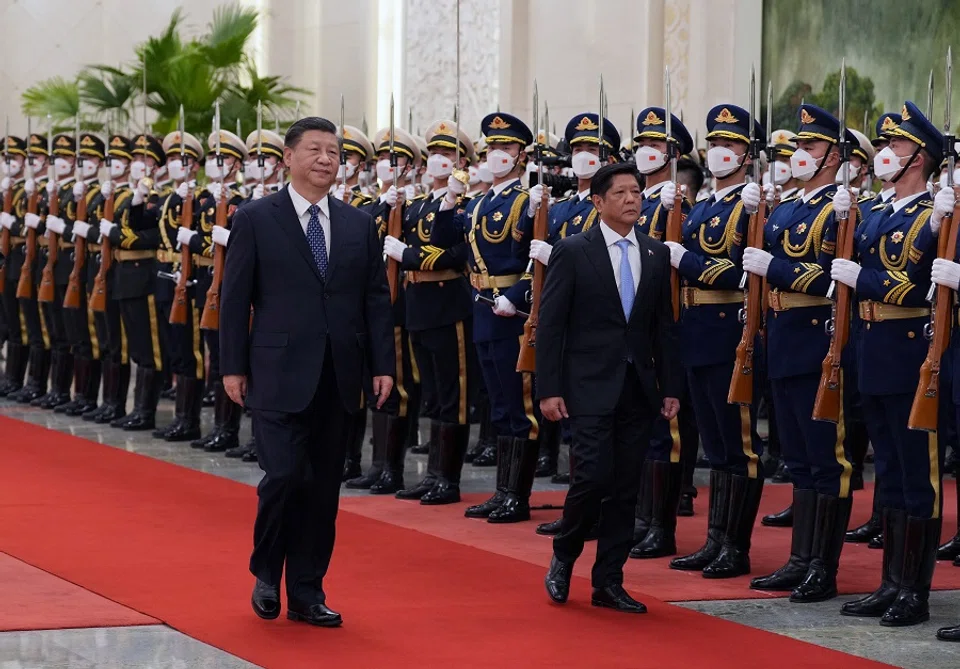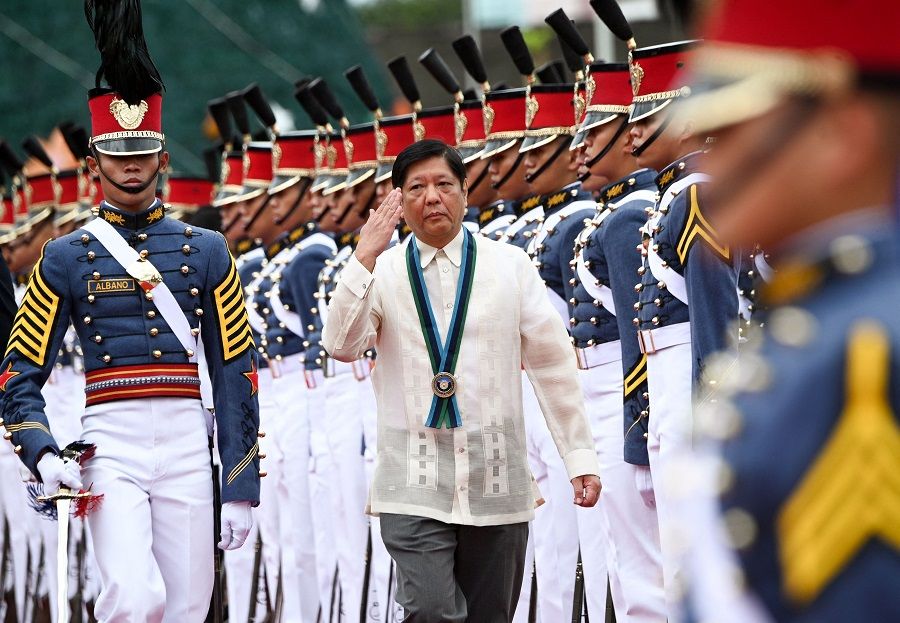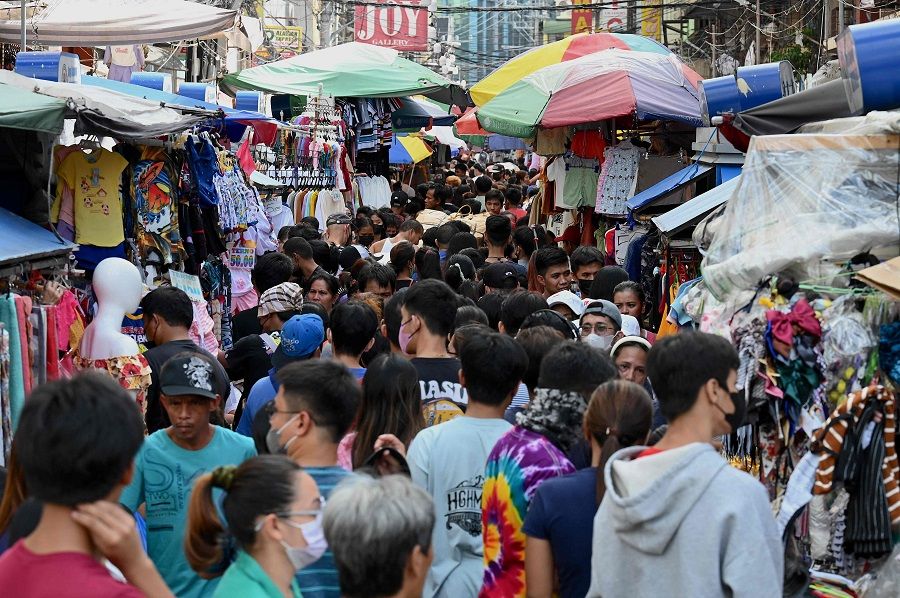Between economy and security: Does the Philippines' Marcos Jr have a choice?

Philippine President Ferdinand Marcos Jr opened 2023 with his first state visit to China on 3-5 January. With trade at the top of his agenda, he brought with him a sizeable business delegation (60 to 80 people of the total 200-member delegation) and garnered over US$22.8 billion in investment pledges, including US$1.72 billion for agribusiness, US$13.76 billion for renewable energy, and US$7.32 billion for strategic monitoring of, for example, electric vehicles and mineral processing. Complementing these pledges are fourteen bilateral agreements on tourism, trade, information exchange, and others.
President Marcos' focus on economic matters bodes well for a country that is recovering from the Covid-19 pandemic. Prioritising food security, energy security, and digitisation are good foundations for jumpstarting the return of the economy to pre-pandemic levels. Nevertheless, security should remain a top priority. Otherwise, the Marcos administration may fall into the same plight as the Duterte presidency when its foreign policy pivoted toward China at the expense of the diversification of the country's international relations.
Security paramount
Marcos was originally touted as Duterte's continuity candidate, but half a year into his presidency demonstrates that he seems more inclined to place security front and centre. In his first State of the Nation Address in June 2022, he spoke of "not giving up an inch" of Philippine territory to any foreign power. In the ASEAN Summits and related meetings in Cambodia in November 2022, he reiterated the significance of maritime security, especially as it touches on transnational crime; illegal, unregulated, and unreported fishing; maritime plastic debris; and marine pollution. At the ASEAN Plus Three Summit, he emphasised safety and freedom of navigation in accordance with the UNCLOS.
President Marcos and President Xi Jinping agreed to back the early conclusion of the Code of Conduct a few days ahead of US Vice-President Kamala Harris' visit to the Philippines, which is quite telling about the play of Marcos' "friend to all and enemy to none" foreign policy. However, nowhere in his international engagements was there any mention of the 2016 arbitration award and how to leverage it. A possible explanation for this is the realisation that using the award to advance the Philippines' national interest will create friction, particularly with China, and this is something that Marcos is not willing to risk.
... but the onus rests on the Philippines in keeping the West Philippine Sea on the agenda.

In this context, it does not come as a surprise that the strong stance on security is noticeably absent from Marcos' recent visit to China. This is understandable to a certain extent, given China's penchant for avoiding sensitive issues, but the onus rests on the Philippines in keeping the West Philippine Sea on the agenda.
There are generally three ways in which the Philippines can leverage the 2016 award. First, Marcos must regularly mention the award at summits and in his international engagements. Being silent about it is tantamount to refusing to uphold the rules-based international order. It is also as much a reflection of the Philippines' credibility as a responsible member of the international community. Being silent about it cements the defeatist stance that was pervasive during the Duterte administration.
A second way that the Philippines can leverage the 2016 award is to continue with the modernisation of the Armed Forces of the Philippines and to garner support for the Philippine Coast Guard. At the very least, this allows local fisher folks to fish in Philippine waters as safely as possible. Marcos reported that he discussed the plight of Filipino fishermen with Xi and that the latter vowed to "find a compromise". It is unclear how the setting up of a hotline between the two countries can iron out the details to avert miscommunication in the South China Sea.
Opportunity to diversify partners
A third way in which the Philippines can leverage the arbitration award is regarding joint exploration. There is a lot of politics here, not least of which is because of constitutional constraints. There has been a moratorium on petroleum exploration, but this has been lifted in 2020.
In October 2022, the Department of Justice issued a decision that exempts renewable energy projects from the 60/40 rule on foreign investments in the Philippines. The decision entails that foreign investors who are keen on full ownership of renewable energy projects in the Philippines are now free to do so. Xi told Marcos that China is ready to reopen exploration talks, but Marcos should realise that this opens the possibilities for other partners for the Philippines too, as long as these projects are transparent and abide by the constitution and the 2016 award.
He said the right things at the right time and never went off-script, unlike Duterte who was notorious for shooting from the hip.

If Marcos is serious about departing from Duterte's policy directions, then his administration should do two things. The first is to make the recalibration that pursuing an independent foreign policy means diversifying the country's international relations. By doing so, Marcos reestablishes the Philippines' credibility in the international community of states.
He has so far managed to do this in his visits to Southeast Asia, the US, the European Union, and now to China where he portrayed the Philippines as an upstanding state. He said the right things at the right time and never went off-script, unlike Duterte who was notorious for shooting from the hip. Marcos can solidify the new phase of Philippine foreign policy by ensuring that the 2016 arbitration award is used to uphold and protect the country's national interests.
As it stands, however, the new administration is without a clear economic strategy.
A second way to distinguish the Marcos administration from Duterte's is to take domestic considerations seriously. The Philippines remains deeply in debt due to borrowings during the pandemic. The Duterte administration left behind an outstanding debt of roughly US$223 billion. By the time the Marcos presidency started, Philippine debt reached a new record of US$224 billion.
As it stands, however, the new administration is without a clear economic strategy. The proposals on the Maharlika wealth fund and the airport fiasco on New Year's Day are indicative of governance missteps.
It then makes sense why the economic agenda took precedence during the Beijing trip. But if security concerns continue to be swept under the rug, the country will find it severely challenging to navigate the post-pandemic geopolitical environment.
Related: While preserving good relations with China, the Philippines must exercise its maritime rights | 2022 elections may bring change to the Philippines' China policy | Mind the gaps, fill the needs: A strategic outlook for the Philippine-US alliance | The Belt and Road Initiative and the Philippines' post-Duterte China challenge
